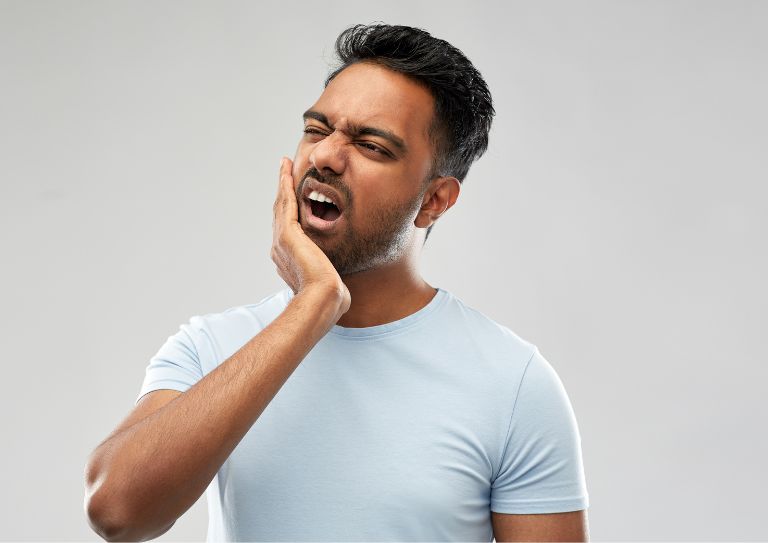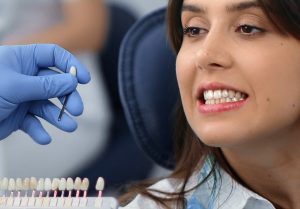A few years back, we met 14-year-old Candice (not her real name), who sought help for jaw joint pain on her left side. Her mom noticed that Candice had to tinker with her jaw while eating.
For two years, Candice endured this discomfort. Whenever Candice moved her jaw, it made clicking sounds. She even faced a “locked jaw” scenario where her jaw got temporarily stuck, making it tricky to open her mouth.
For many individuals, the experience of a jaw that keeps locking and clicking can be uncomfortable and a cause for concern. This phenomenon, often associated with temporomandibular joint (TMJ) issues, can have various underlying causes. This article explores why your jaw may exhibit these symptoms and what steps you can take to find relief.
Temporomandibular Joint Disorder (TMJ Disorder): Root Cause of Jaw Locking and Clicking
Imagine a long and tiring day. A yawn escapes your mouth and you wait for your jaw to slowly close shut. But unexpectedly, it stays stuck. It’s a scary moment. You panic.
So why does jaw locking happen? In most cases, it is related to your Temporomandibular Joint (TMJ).
The temporomandibular joint, or TMJ, is a complex joint that connects your jawbone to your skull. It facilitates essential functions like chewing, talking, and yawning. When this joint encounters problems, it can result in a range of symptoms, including jaw locking and clicking.
TMJ Disorder/TMD is a broad term encompassing various conditions that affect the TMJ. It can lead to jaw stiffness, clicking sounds, and, in some cases, the jaw locking in an open or closed position.
What Causes TMJ Disorder
1. Bruxism (Teeth Grinding)
Persistent teeth grinding, often done unconsciously during sleep, can contribute to TMJ issues. The constant grinding puts excessive strain on the jaw joint, leading to discomfort, clicking, and locking.
2. Malocclusion (Misalignment of Teeth)
Misaligned teeth can disrupt the normal functioning of the jaw, causing strain on the TMJ. This misalignment may result in the jaw locking or clicking when trying to move.
3. Arthritis
Conditions like arthritis can affect the TMJ, leading to inflammation and restricted movement. Individuals with arthritis may experience jaw locking and clicking as a result.
4. Injury or Trauma:
A direct blow to the jaw or any trauma that affects the TMJ can result in mechanical issues, leading to locking or clicking sensations.

Symptoms of TMJ Disorder
People who experience jaw locking and clicking as a symptom of TMJ disorder often present with accompanying symptoms, including:
- Pain or tenderness in the jaw, face, head, neck or in front of your ears
- Swelling in the face
- A sudden change in the way the upper and lower teeth fit together
- Worn, cracked, or broken teeth
- Headaches, earaches, tinnitus (ringing in the ears), dizziness, and hearing issues
The severity of jaw clicking can vary, affecting one or both sides of the face.
Managing Jaw Locking and Clicking:
1. Professional Evaluation
If you’re experiencing persistent jaw issues, seeking professional evaluation is crucial. A dentist or a healthcare provider specialising in TMJ disorders can assess your symptoms, identify the underlying cause, and recommend an appropriate treatment plan.
2. TENS Therapy:
TENS, or Transcutaneous Electrical Nerve Stimulation, employs a small device with sticky pad electrodes placed directly on the skin. The device sends gentle electrical impulses to the jaw, providing temporary pain relief.
3. Orthodontic Intervention:
In cases where misaligned teeth contribute to jaw problems, orthodontic treatment may be recommended. Braces or aligners can help correct the alignment, alleviating TMJ symptoms.
4. Custom Orthotic:
A custom orthotic for TMJ (temporomandibular joint) disorder stabilises the jaw joint, alleviates pain, and promotes proper jaw function. It achieves this by providing support and alignment, reducing muscle tension, and preventing teeth grinding. The orthotic facilitates a more balanced jaw movement, helps prevent jaw locking or clicking, and ensures an even distribution of bite force.
Get to the Root Cause of Jaw Locking and Clicking
If you’re experiencing jaw locking and clicking, it could be a sign of Temporomandibular Disorder (TMJ Disorder). DP Dental prioritises a comprehensive assessment of your dental health, posture, and sleep patterns to address the root causes of TMD effectively.
With over four years of training in TMD from the USA, Dr Yue Weng Cheu shares his expertise globally. Using modern, evidence-based methods, he successfully treats TMJ Disorder and teeth misalignment without extractions.
For any concerns, contact us for a consultation with Dr. Yue or visit https://www.dpdental.com/tmj-disorder-treatment-singapore/ to schedule an appointment. Your well-being is our priority, and we’re dedicated to helping you find relief from jaw locking and clicking related to TMJ Disorder.




